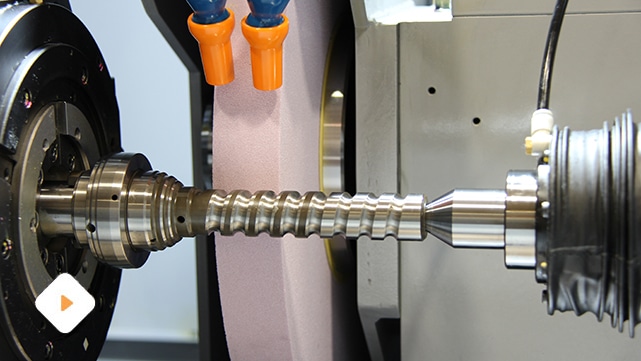CNC Grinding Machines: Precision and Efficiency for Modern Manufacturing
Introduction to CNC Grinding Machines
CNC (Computer Numerical Control) grinding machines are a fundamental part of precision manufacturing, offering high levels of accuracy and consistency. These machines are used across a range of industries, including automotive, aerospace, medical, and tooling, to produce parts with very tight tolerances and smooth surface finishes. CNC grinding is crucial for producing complex parts where precision is vital.
This article explores the features, types, benefits, and applications of CNC grinding machines, emphasizing their role in enhancing manufacturing processes.
What is a CNC Grinding Machine?
A CNC grinding machine is a type of grinding machine that uses computer-controlled programming to automate the grinding process. Unlike traditional manual grinding machines, CNC grinders are controlled by computer software, which ensures the accuracy of the grinding operation. This enables the machine to perform complex grinding tasks with high precision and repeatability, making it indispensable in industries that require exacting standards.
CNC grinding machines use rotating grinding wheels to remove material from the workpiece. Depending on the type of grinding process (such as surface grinding, cylindrical grinding, or internal grinding), the machine will manipulate the grinding wheel in different ways to shape and finish the part.
How CNC Grinding Machines Work
CNC grinding machines operate by using a computer-controlled grinding wheel to precisely remove material from a workpiece. The machine works in a few stages:
- Workpiece Setup: The workpiece is secured onto the machine bed, often using a fixture or clamp to ensure stability during grinding.
- CNC Programming: The operator enters the required parameters into the CNC system, such as grinding speed, depth of cut, feed rate, and the number of passes.
- Grinding Process: The grinding wheel is brought into contact with the workpiece, and the grinding machine begins to remove material according to the programmed instructions.
- Finishing: The process is repeated until the part reaches the desired dimensions and surface finish.
The benefit of CNC control is that the machine can perform these tasks automatically with minimal human intervention, which reduces the risk of error and ensures uniformity across multiple parts.
Types of CNC Grinding Machines
CNC grinding machines come in various configurations, each suited for different applications. The most common types include:
- CNC Surface Grinding Machines
These machines are designed to produce a smooth, flat surface on a workpiece. The grinding wheel moves over the surface of the part to remove material, creating a smooth finish. CNC surface grinders are widely used in metalworking industries to create parts with flat surfaces, such as plates, discs, and washers. - CNC Cylindrical Grinding Machines
CNC cylindrical grinders are used to grind the external and internal surfaces of cylindrical workpieces. The machine can perform grinding tasks on both the outer diameter (OD) and the inner diameter (ID) of the workpiece. This type of grinding is essential for manufacturing parts such as shafts, pins, and bushings. - CNC Internal Grinding Machines
Internal grinding machines are used to grind the inner surface of a workpiece, such as bore holes or cavities. The grinding wheel is inserted into the workpiece, which allows it to be ground to precise diameters and finishes. These machines are commonly used in the automotive, aerospace, and toolmaking industries. - CNC Tool and Cutter Grinding Machines
CNC tool and cutter grinders are used for sharpening and reconditioning cutting tools like drills, milling cutters, and taps. These machines ensure that tools are maintained to high precision, improving their lifespan and functionality. - CNC Jig Grinding Machines
Jig grinders are specialized machines used for high-precision finishing, particularly for creating precise holes, slots, and profiles. They are widely used in the manufacturing of molds, dies, and parts that require very tight tolerances and high surface quality.
Benefits of CNC Grinding Machines
CNC grinding machines offer a wide range of advantages, making them a vital asset to modern manufacturing. Some of the key benefits include:
- High Precision and Accuracy
CNC grinding machines are capable of achieving incredibly tight tolerances, with accuracy levels as fine as a few microns. This precision makes CNC grinding machines indispensable for producing components with intricate geometries, such as gears, bearings, and automotive parts. - Increased Productivity
With CNC technology, the grinding process can be automated, reducing the need for manual labor and minimizing errors. This leads to faster production cycles, especially in high-volume manufacturing. The ability to perform multiple tasks without human intervention also allows for continuous operation, increasing overall productivity. - Repeatability and Consistency
CNC grinding machines are programmed to execute the same task repeatedly with the same level of precision. This repeatability is essential for industries that require large quantities of identical components, ensuring uniformity and reducing the chances of defects. - Complex Geometry Creation
Unlike traditional manual grinding methods, CNC grinders can create highly complex and precise shapes. The machine’s computer control allows for multi-axis movement, enabling the production of intricate profiles and geometries that would be difficult to achieve with conventional grinding methods. - Reduced Setup Time
CNC grinders are designed for quick setup and minimal downtime. Once a program is entered, the machine can start grinding immediately, making them ideal for production environments where speed and efficiency are critical. The flexibility of CNC machines also allows for easy switching between different tasks or part types, which reduces the time spent on setup. - Improved Surface Finish
CNC grinding machines can produce parts with very smooth surface finishes. This is particularly important for components used in high-performance environments, where surface roughness can affect functionality. The automated nature of CNC grinders also ensures that the surface finish is consistent across all parts.
Applications of CNC Grinding Machines
CNC grinding machines are used in various industries, providing critical precision and surface finishing for a wide range of components. Some key applications include:
- Automotive Industry
CNC grinding machines are used in the automotive sector to manufacture precision components such as gears, camshafts, crankshafts, and bearings. The ability to grind these parts with high accuracy ensures that vehicles run smoothly and reliably. - Aerospace Industry
In aerospace, CNC grinders are used to produce complex parts for engines, landing gears, and turbine blades. Given the importance of safety and performance in aerospace applications, CNC grinding machines ensure that components meet strict regulatory standards and function reliably under extreme conditions. - Medical Industry
CNC grinding machines play a critical role in the production of medical components, such as surgical instruments, dental implants, and prosthetics. These parts require high precision to ensure they function correctly and meet safety standards. The high degree of accuracy provided by CNC grinders makes them ideal for the production of medical devices. - Tooling and Manufacturing
CNC tool and cutter grinding machines are commonly used to maintain and sharpen cutting tools such as drills, end mills, and reamers. By ensuring that tools remain sharp, CNC grinding helps maintain productivity and reduces the frequency of tool replacements. - Mold and Die Making
CNC grinding machines are often used in mold and die making, where tight tolerances and high-quality finishes are required. The ability to create complex geometries and smooth surfaces makes CNC grinders essential for the production of molds used in injection molding, stamping, and other manufacturing processes. - Electronics Industry
The electronics industry uses CNC grinding machines to produce precise components, such as connectors, capacitors, and resistors. These parts often have intricate shapes and fine finishes, making CNC grinding an ideal solution for their production.
Conclusion
CNC grinding machines have become an essential part of modern manufacturing, offering a level of precision, automation, and efficiency that traditional grinding methods cannot match. From automotive and aerospace to medical and tooling applications, CNC grinders are indispensable for producing high-quality parts with tight tolerances and smooth surface finishes.
As industries continue to demand greater precision and efficiency, CNC grinding machines will remain at the forefront of technological advancements in manufacturing. By improving productivity, reducing human error, and enabling the production of complex geometries, CNC grinding machines are poised to shape the future of precision manufacturing across various industries.












Post Comment